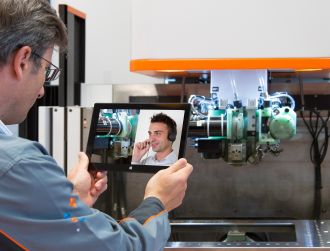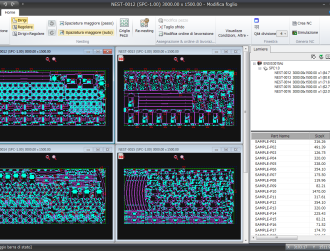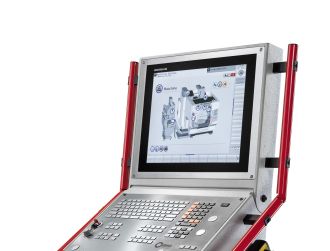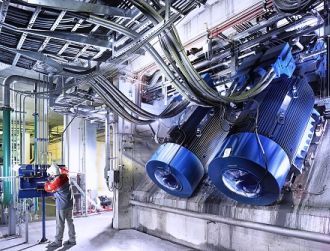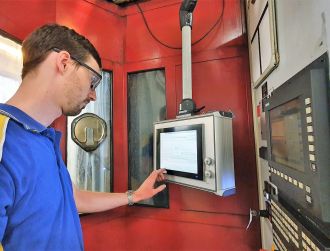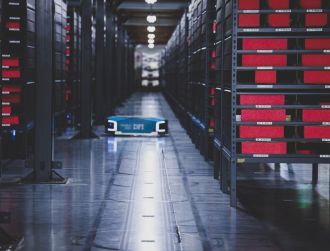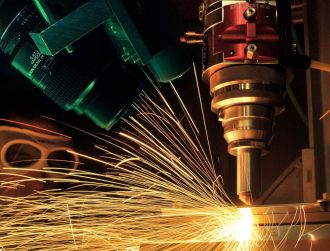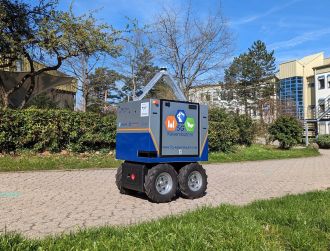
AI breathing new life into industrial production
Automation and digitalisation are now indispensable features of modern factories. The manufacturing industry is now turning to artificial intelligence (AI) to spark its next stage of development. But what will manufacturing look like in the future? How much higher can efficiency levels be raised? And what does the arrival of AI on the shop floor mean for skilled workers? Answers to these questions and more will be provided at NORTEC in Hamburg from 23 to 26 January 2024.
Artificial intelligence has become indispensable in the monitoring and control of machines. Neural networks are now used as a matter of course, even in highly specialised machine tools. "Artificial intelligence in the form of neural networks is often used to monitor machines. The networks are ‘trained’ using large amounts of data from various sensors in order to predict signal patterns," says Prof. Berend Denkena, head of the Institute of Production Engineering and Machine Tools (IFW) at Leibniz University Hannover, explaining the principle. The staff are informed, and the machine is stopped if there is a discrepancy between the predicted and the actual signal pattern.
Easier machine operation
AI is evolving rapidly, which means that industry professionals have to contend with a constant barrage of new trends. According to Denkena, current innovations of special interest include the development of AI assistance systems based on large-scale language models. These model the succession of elements in a sequence. AI assistants such as the Github Copilot are already gaining acceptance in the field of software development, for example.
The cloud-based tool, developed by Microsoft subsidiary Github and AI specialist OpenAI, helps specialists to program by auto-completing codes. "AI assistants also offer great potential in production where they can simplify machine operation, which is currently highly complex in some cases," says Denkena.
Sensors as basis for predictive maintenance
In industry, AI has already become established in the field of predictive maintenance. Sensors and neural networks help detect whether a machine is defective and requires maintenance. Manufacturing technology manufacturers often partner with researchers and research-oriented startups in order to address this research-intensive field.
The Hamburg-based startup ai-omatic solutions, for example, specialises in predictive maintenance. Lena Weirauch, CEO and co-founder of ai-omatic, explains: "AI makes it possible to understand information, recognise patterns, solve problems, and make decisions. The data used for ‘training’ such AI therefore plays a very big role."
This works particularly well in production technology, she says, because of the considerable database which already exists. Predictive maintenance is also so attractive "...because many machines are already equipped with a large number of sensors that generate data which can then be evaluated," says Weirauch.
According to Weirauch, AI-based processes that have already made the leap from the research lab to industrial practice include image recognition technologies that are used for quality inspection in manufacturing or for autonomous navigation of robots and drones. Industrial robots and cobots (collaborative robots) are equipped with advanced AI algorithms to perform tasks in manufacturing, logistics and inventory management, she explains.
Intelligent packing and sorting
Such cobots are offered by the robot manufacturer Yaskawa in Kitakyushu, Japan, for example. The intelligent machines can pack pallets in a fully automated process. They use AI which allows them to do away with protective guards, to work with different types of pallets, and to load different pallet heights.
Robotics specialist Schunk, based in Heuchelheim, Hesse, also equips robots with AI, enabling them to recognise objects and sort them accordingly. This allows small and medium-sized companies to automate sorting tasks, for example, and have their machines work through the night.
Laser specialist Trumpf, based in Ditzingen in the southwest of Germany, is also developing the use of AI in production. The company launched an AI-based system in 2020 that helps employees sort components. This "Sorting Guide" is displayed on a screen in their work environment, graphically showing employees which components belongs to which job orders. In addition, the screen also contains all relevant information on the follow-up processes. This should significantly increase production efficiency, especially in the case of sheet metal panels used for a range of different orders, promises Alexander Kunz, head of the Smart Factory unit at Trumpf.
More efficient than humans
"We feed the AI with data until it can recognise new situations faster and make better decisions than a human or a conservative algorithm," Kunz explains. "Only then do we refer to this as AI at Trumpf." Two key use cases are diagnosis-based process optimisation and preventive prediction.
Trumpf's "Active Speed Control" system (see picture) for laser cutting, for example, makes use of a camera which takes 40 images per second. "We train the AI to distinguish good cross-sectional images from bad ones and then to decide upon appropriate action. This allows us to continuously improve the cutting quality," says Kunz. In the case of preventive prediction, for example, the AI recognises independently if a contour is difficult to produce or when a part is in danger of jamming. "Again, we can train the system to take appropriate action by itself. This helps prevent mistakes before they happen."
For artificial intelligence to be able to develop, it must be able to draw on natural intelligence and the experiential knowledge of humans. This means that specialists must train the AI before it can be used. This is the point at which a merely intelligent machine can turn into a self-learning machine.
Preserving knowledge to combat skills shortages
This makes AI particularly appealing in the face of the current skills shortages. "In my view, demographic change is making the feeding of domain knowledge into artificial intelligence one of the most exciting research topics in production engineering right now," explains Prof. Christian Brecher, who heads the Chair of Machine Tools at the Laboratory for Machine Tools and Production Engineering at RWTH Aachen University. The "preservation of expert knowledge," as Brecher calls the transfer of knowledge from man to machine, will help to counteract the serious shortage of skilled workers in the future.
However, small and medium-sized companies often lack the necessary financial and human resources to integrate AI into their production. "One solution would be to collaborate and form partnerships," says Brecher, who is also a board member of the WGP (German Academic Association for Production Technology), an association of leading researchers in production science. "In Aachen, this is the strategy we are pursuing in our numerous centers and specialist working groups."
Furthermore, transfer projects are helping to take the knowledge from the research lab into industry. One example is the Demonstration and Transfer Network AI in Production (ProKI), which is being given extensive support by the WGP. A total of eight centers throughout Germany are offering training courses and transfer projects to manufacturing companies.
It’s all about the data
The use of AI in industrial production offers many advantages, but it also brings its own challenges. First of all, AI models need sufficient quantities of high-quality data. That is why Lena Weirauch of ai-omatic has issued a pragmatic recommendation for companies to "...first create use cases for which data may already be available." Integrating AI into existing production processes and machines can also be a complex undertaking which requires multiple adjustments and investments. This why it makes sense for companies first to use standard tools or existing AI applications instead of developing their own.
Employees require training
Humans aren't always easy to convince regarding the use of AI either, as the startup founder notes. "Often, there is an initial antipathy toward AI – arising from ignorance and a lack of knowledge," Weihrauch says. Employees need to be prepared and given training in AI systems to ensure they can use them effectively. Nonetheless, Weirauch acknowledges that AI in manufacturing raises ethical questions, particularly with regard to the use of autonomous robots and their impact on jobs.
Will skilled workers really become superfluous in factories once their knowledge has been transferred to the AI system? Denkena considers the issue from different angles: "Before all major technological revolutions, the question was raised whether the new technology would make humans obsolete," he says. “It was difficult to imagine what new role humans would play in factories before computer-controlled machines were introduced. Today, of course, we see computers as tools that we use and not as our rivals. I think we'll come to see artificial intelligence as a tool in the same way in the future."
Tasks of skilled workers becoming more complex
Nevertheless, the people working in smart factories will require new skills. "Employees will need software skills – and will need to be versatile," explains Denkena. Artificial intelligence is set to increase both the number of machines and their degree of automation. Programming the individual machines will become much easier, however employees will be expected to handle a large number of different machines.
If AI is to succeed, it will need to overcome a degree of resistance – even from the executives of manufacturing companies. "Many companies are still very reluctant to share data," says Denkena. There are scarcely any industrial production datasets available on large AI platforms like Hugging Face, he says. In many other areas, however, open source has been instrumental in ensuring the success of AI models. "In addition, the level of standardised communication is still insufficient for the Internet of Things," warns Denkena. Individual solutions are required for everything, including data acquisition. "The necessary financial investment make it particularly difficult for small and medium-sized companies to get started with AI."
Meanwhile, AI is clearly unavoidable if industrial production is to remain internationally competitive. "Given the challenges facing German and European industry, AI will play an important role in raising the efficiency of our production and business processes, and thus our competitiveness," says Brecher. In addition, AI will be a decisive factor in determining companies' ability to innovate their products and production processes.

